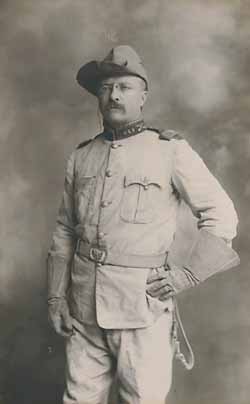By Jeremy Dibbell
 Our Object of the Month for May is a fascinating 3 July 1898 letter from Theodore Roosevelt to Henry Cabot Lodge, written just after the famous Battle of San Juan Hill, as the siege of Santiago continued. Roosevelt (pictured at left in his Rough Rider uniform) urges his friend, “Cabot,” to “Tell the President for Heavens sake to send us every regiment and above all every battery possible. … We are within measurable distance of a terrible military disaster; we must have help — thousands of men, batteries, & food & ammunition.” Roosevelt has even added at the corner of the front page of the letter, “For God’s sake have heavy reinforcements sent us instantly.”
Our Object of the Month for May is a fascinating 3 July 1898 letter from Theodore Roosevelt to Henry Cabot Lodge, written just after the famous Battle of San Juan Hill, as the siege of Santiago continued. Roosevelt (pictured at left in his Rough Rider uniform) urges his friend, “Cabot,” to “Tell the President for Heavens sake to send us every regiment and above all every battery possible. … We are within measurable distance of a terrible military disaster; we must have help — thousands of men, batteries, & food & ammunition.” Roosevelt has even added at the corner of the front page of the letter, “For God’s sake have heavy reinforcements sent us instantly.”
As the Object essay notes, “Few documents show so vividly the contingency of history: Roosevelt believed the situation was so dire that he was prepared to go outside the army chain of command to send a message directly to the president. In fact, the result of the battle on 1 July was almost exactly opposite what Roosevelt expected. Within two weeks the Spanish would lose their naval squadron at Santiago and surrender the city.”
You can read a transcription of the letter, see images of all four pages and learn more about the background of the document here.
This Object of the Month celebrates the publication of The War Lovers: Roosevelt, Lodge, Hearst, and the Rush to Empire, 1898 (New York: Little, Brown and Company, 2010) by Evan Thomas, a corresponding fellow of the Historical Society, who spoke here about the book last week. In The War Lovers, Thomas argues that, more than the American Civil War, or even World War II, the Spanish-American War was a harbinger–if not the model–of modern American wars. The “splendid little war” against Spain was a “war of choice,” not immediately vital to national security but ostensibly waged for broader and sometimes shifting humanitarian purposes. A sampling of the letters, diaries, and photographs of Theodore Roosevelt and Henry Cabot Lodge that Thomas used in writing The War Lovers will be on display here at 1154 Boylston each afternoon from 1:00-4:00 p.m., Monday-Saturday, through 5 June 2010.

